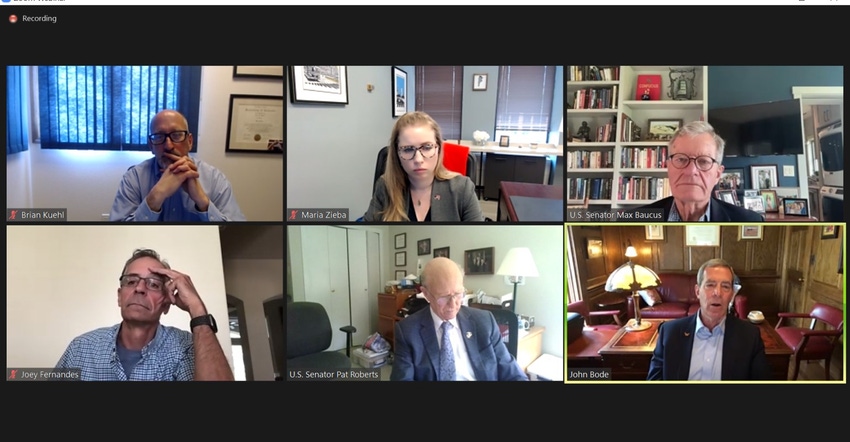
Withdrawal from the Trans-Pacific Partnership was a mistake as it relates to America’s broader economic and national security interests, especially for building U.S. agricultural trading markets and countering China’s strength in southeast Asia, shared former Senators Max Baucus and Pat Roberts. However, the Biden administration’s starting of the Indo-Pacific Economic Framework offers a way to reinsert leadership in the region.
IPEF discussions look to strengthen ties in the region with a dozen international partners which represent 40% of the world’s GDP, many of the same players who are in the now Comprehensive and Progressive Agreement for Trans-Pacific Partnership. However, the initial discussions do not plan to include market access or tariff issues pertaining to agriculture.
“There can be no region more important to America’s economic future, and frankly national security and the global future, than the Indo-Pacific region,” shares Baucus during a townhall hosted by Farmers for Free Trade on June 1 which focused on the benefits of IPEF.
Baucus, who also served as the ambassador to China during the final Obama years, worked very hard to encourage members of Congress to approve TPP until presidential candidates at the time Hillary Clinton and Donald Trump signaled its doom. He tried to persuade Congressional members about the importance of TPP to serve as a counterweight to China.
“I think that when we pulled out of TPP, we really abdicated our leadership to create a huge vacuum in southeast Asia,” Baucus explains.
“We’re not going to get TPP passed. That’s clear. So, this is sort of the next step,” explains Baucus of the IPEF discussions which provide a starting point that may create opportunities to later include market access or tariff reduction goals to benefit agriculture.
Joey Fernandes, a third-generation dairy farmer on Fernjo Farms in Tulare, Calif., shares he’s disappointed in the recent progress made on the trade front. In negotiating TPP, he sees all the effort that was made by so many and low long it took, yet nothing to come to fruition is “frustrating,” he explains.
“I think a lot of us farmers can be impatient,” Fernandes says. “As I sit here, I’m cautiously optimistic today about what’s in front of us now with IPEF.” He says he hopes to see a focus on timely results that will make a difference on the ground, as dairy producers see great opportunities for expanded export growth in the region.
Maria Zieba, assistant vice president of international affairs at the National Pork Producers Council, also says the pork industry was disappointed when the U.S. pulled out of the TPP. The pork industry exports about 30% of its production and in 2021, that meant $8.1 billion of pork and pork products.
“Exports are vital to the success of the industry because over a third of the average price of a hog can be directly tied to exports. So, without these exports, we can see those prices decline,” Zieba says.
She recognized that during the Biden administration, the pork industry has seen many “one-off wins” including the opening of pork trade with India after 20 years of work and the Philippines and Vietnam reducing their tariffs on pork and increasing allowed import quotas.
IPEF offers momentum on ag issues
Zieba adds that sanitary and phytosanitary issues the ag industry face are numerous, and IPEF could create some positive movement to address some of those long-standing issues. “I think this applies a bit more pressure and you can work collaboratively with other countries that are part of IPEF to apply pressure because it’s likely that if U.S. agriculture is facing SPS issues in X-country, that our competitors in other IPEF countries are similarly likely to face them as well. So perhaps there’s opportunity to build coalitions and then push on certain issues that could be very sensitive and have some market opening,” she explains.
Baucus believes the IPEF discussions offer a way to re-enter back into the region, without the political suicide of re-entering the TPP which was unliked by unions. But even without agricultural market access in the first phase, Baucus says “something’s better than nothing” as these discussions get underway.
“You build on it. Get more trust with it, then after awhile it can build up trust in the United States politically so American political structures are a little more interested in moving the next steps toward market access and trade,” Baucus says.
Zieba adds IPEF puts the U.S. in a position in some key markets and countries in southeast Asia and establishes a presence and a baseline to have ongoing conversations and find common ground on a number of issues, whether they're their agricultural or non-ag issues.
“This is hopefully the basis of further negotiations that that can expand once the common steps are negotiated on,” Zieba says.
About the Author(s)
You May Also Like






